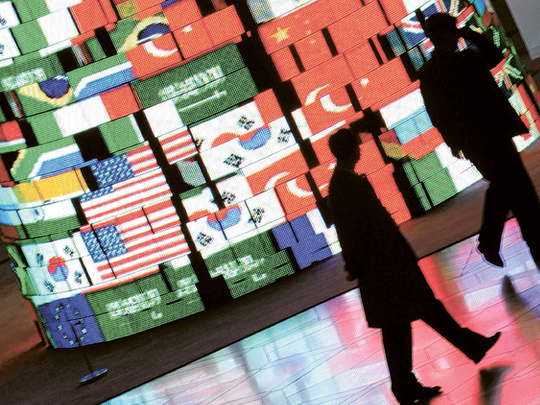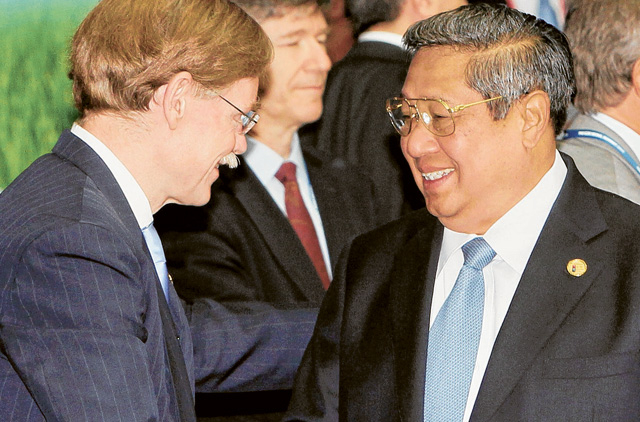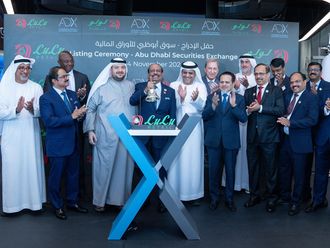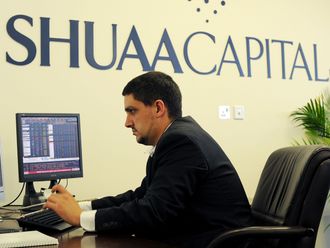
After a week of overcast skies, the weekend in Seoul, South Korea, promises to be sunny and warm.
That is a much deserved respite for a city as the G20 Seoul Summit drew to a close and a global contingent of bureaucrats, ministers, presidents and prime ministers, demonstrators and putative saboteurs head home.
The Seoul meet that culminated with a Seoul Declaration will be remembered for the consensus that the need of the hour was the following: a "market-determined exchange rate systems" that allowed for the "exchange rate flexibility to reflect underlying economic fundamentals" and saw the importance of "refraining from competitive devaluation of currencies".
These are wolf-whistles to observers and markets that an active effort to change global exchange rate policies is ongoing but nothing concrete just yet! Seoul will be remembered, as a place where things could have gotten worse, but didn't.
In this, the maturity shown by the South Koreans to tamp down expectations before the event and to wriggle out an agreement by the end — however lukewarm — ought to be studied by future multilateral event coordinators and power brokers.
Last week, when the G20 met the nature of the world that has transformed dramatically from the early days of 1973 when it all began in Washington DC. Today, the countries of the group command in excess of 80 per cent of the world's trade and 85 per cent of global Gross National Product.
Concurrently, the industrialised world — America and Europe — find themselves in the unique position where in, not only do they have to deal with the intransigence of rising economic powers but also have to tackle long term domestic structural reforms.
Aging demographic
All of these problems are compounded by an ageing demographic and in America, the emergence of a recalcitrant legislative situation that strains the idea of bipartisan consensus.
To muddy the waters further, global capital flows have found alternate places to earn higher yields — be it in India, China or Brazil; all of whom increasingly see the West as equals.
Rising popular consciousness in democracies, and even in authoritarian systems, courtesy electronic media and sophisticated civil society, ensure that the political elite of the emerging markets cannot pawn the house silver to sup at the high table of global finance. In essence, a new global reality of increased negotiations on an equal footing is upon us.
The Seoul meeting began with a fair amount of public posturing. The Americans insisted that the Yuan's managed exchange rate were the root cause of the global capital imbalances.
In response, the Chinese and Germans responded that the American policy directives such as the Quantitative Easing programme poses great danger than understood. It is, naturally, difficult to ascertain how much of this is an instance of public diplomacy and what is for their own domestic consumption.
Nevertheless, it is clear the major parties arrived at this meet with considerable baggage.
One of the "successes" of Seoul was the G20 "endorsing a timetable" that would facilitate a rethink and rework the international regulatory framework for banks. The G20's exact proposals, whatever they may be, are to be implemented by the Financial Stability Board.
As per available reports (Financial Times) before the meeting itself there was consensus that any regulatory efforts would only affect the institutions that span jurisdictional boundaries.
Incentives
As bizarre as it may seem, one cannot but wonder if this idea sets up perverse incentives for the banks. Consider, a small bank that is tightly regulated in a domestic market may find it optimal to expand its operations across borders, solely as an act of regulatory dodge to be reclassified.
This may particularly be the case, should the global regulatory agency have limited ability to enforce the stipulations of Basel 3. One critical point that finds little mention is the impact of increased capital requirements. As Ricardo Caballero at MIT has effectively argued, the world has one singular shortage: of quality collateral.
As banks become bigger, span countries with reduced abilities to monitor and extract information (think Citibank in Pakistan) — these countries are likely to impose greater demands for "quality" collateral and raise its price.
There also remains the eternally vexing issue of bankruptcy, which remains within local realm of commercial law. And any global law that tries to address this runs into the intractable tension between the sovereignty of the State versus the stability of the global financial system.
Seoul provides no clear answer, or even guidance. Perhaps because while everyone agrees on what the ailment is, no one knows what the exact cure ought to be.
At the heart of all the public acrimony that we saw at the beginning of the summit — two disagreements loom large. One, whether China is fixing the exchange rates to unduly boost its exports; and two, whether the US's ambitious "quantitative easing" was inflationary with global consequences.
Exchange rate
While many might not agree on what the right exchange rate is between the yuan to a dollar is; it is clear many seem to "know" what is a wrong exchange rate.
Since, 2008 — the rate has roughly stayed around 6.6368 yuan to a dollar for more than two years. The Americans, and many countries, allege that the Chinese have been artificially keeping the Yuan low to aid growth via exports.
The result of this "industrial policy" — where the Chinese sell refrigerators and computers to the Americans in exchange for an unbacked US dollar — is that the industrial base of many parts of America have been (seemingly) decimated forever.
Prior to the economic crisis, the standard refrain in America was that globalisation lowered the cost of living, kept inflation in check and raised corporate profitability.
After the economic crisis, with unemployment ranging from 9 to 17 per cent (depending on what measure you choose), there seems to be, as Angela Merkel said in a tangential context, an increasing divergence between political good and economic good.
It is clear that no multilateral meeting will solve cultural approaches to money and thrift. Yet, the story is depressingly familiar.
Americans don't save enough, while the Chinese save staggering proportions of their income. But these are deeper fault lines in the US, as Professor Raghuram Rajan has argued: inequality that leads to stagnant educational achievements, which in turn leads to politicians and institutions "buying" unemployed American workers with cheap credit and a Wall Street with skewed incentives that encourage irresponsible risk taking.
In contrast, there are no meaningfully large and deep capital market alternatives for the Chinese middle class to invest in. Coupled with capital restrictions imposed by the Communist party, the Chinese middle class has little heterogeneity in its investment options.
The depth, liquidity and transparency of these markets are far from what the increasingly well-off Chinese demand. The only recourse has been to save into bank accounts, which via the global capital routing mechanisms end up buying into US Treasury markets. For the Ying of American consumption, it seems the Yang of excessive Chinese savings is a natural partner.
Prior to the meet, US Treasury Secretary Timothy Geithner had spoken aloud about monitoring levels of current account balance (five per cent of GDP was one figure) But this was shot down. Nobody wanted it after all, except those hurting today.
Agreement
And there were questions with ill-designed answers. After all, what is the consequence of breaking the agreed current account balance bounds. Yet, the G20 meet ended with a face-saving agreement from all sides to institute policies that seek to manage "external imbalances", a term expediently left undefined.
As mentioned in an earlier column, there is the inescapable lure to see the quantitative easing programme by the Federal Reserve as a means to devalue the currency (so say Bank of China Chairman Xiao Gang, and even Alan Greenspan), but this is only a sideshow. The real reason for QE2 is the American concern to prevent a Japan-style deflation and to resuscitate growth.
In the end, Seoul has provided some clarity, albeit of a marginal kind. A Seoul consensus has emerged about need to bring private sector into infrastructure building.
But, other versions of the similar ideas of development have been panned in the past. Some life has been breathed into the long-dead Doha trade talks. The Chinese have acceded that some form of market-based exchange rate is necessary; the Americans have agreed competitive devaluation is bad. A consolation is that some agreement is better than none. Alas, the world needs more in short order for confidence building and sustainable recovery.
One credible achievement by the G20 recently was the agreement to recast the composition of the voting rights in the IMF. Here the European countries have agreed to abdicate two out of the 24-seat governing board and the transfer of 6 per cent or more voting power to the countries from the emerging markets.
One critical question has increasingly cropped up: what exactly is the G20, who does it serve? After all, as Shashi Tharoor, a former Minister in the Indian government recently said in New York, the G20 couldn't consider itself as a replacement for the United Nations, particularly given the singular moral legitimacy of the UN in the eyes of the very poor.
With increased talk about global poverty and development, one cannot but conclude that the G20 is slowly headed to become an elite club with executive powers, a secretariat and pretensions that it can reign in the world wild horses of global finance.
The writer works for a major European investment bank in New York City. All opinions are personal and don't reflect the view of his organisation.
Have your say
Do you think the meeting of the international leaders will strengthen the recovery of the economy? Or is this a waste of time? Tell us what you think at readers@gulfnews.com













